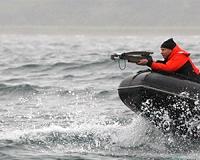| . |  |
. |
Tokyo (AFP) Sept 6, 2010 A Japanese court Monday sentenced two Greenpeace activists to suspended one-year jail terms for stealing a box of whale meat that the group said was proof of embezzlement in state-run "research whaling". Junichi Sato, 33, and Toru Suzuki, 43, were convicted of theft and trespass by the Aomori district court and were each sentenced to one-year jail terms, which were suspended for three years. The two activists admit they stole a box of salted whale meat in 2008 but pleaded not guilty because they say they acted in the public interest to highlight alleged embezzlement in Japan's whaling programme. Greenpeace executive director Kumi Naidoo, in Japan for the verdict, said: "Activists are not criminals and to treat them as such has a chilling effect in society, undermining the quality of democracy." But presiding judge Kenji Ogawa said "the investigative activities went beyond acceptable levels, even if they were in the name of the public interest", the Mainichi Shimbun daily reported. Commercial whaling was banned worldwide in 1986, but Japan set up the non-profit Institute of Cetacean Research the following year and has since culled hundreds of the ocean mammals annually in the name of science. The activists say they were contacted over two years ago by a veteran whaler, who said he was dismayed by what he saw as corruption and waste. His fellow crewmen were receiving boxes of whale meat, often mislabelled as personal belongings, at their homes after they returned from their annual Antarctic hunts, the unidentified whaler said, according to Greenpeace. Sato and Suzuki followed the trail to the depot of a courier company in Aomori, where Suzuki on April 16, 2008 took a 23-kilogram (50-pound) box labelled "cardboard and vinyl", which was filled with whale meat. They later handed the box to Tokyo prosecutors and called a press conference to publicise what they saw as evidence of graft. Officials explained the crew members were receiving boxes of whale meat as "souvenirs". On June 20, police arrested Sato and Suzuki and raided Greenpeace's Tokyo office and staff homes, seizing computer hard drives and boxes of documents. While the embezzlement case was dropped on the day of the arrests, the two activists were taken to Aomori and held for 26 days and interrogated three times a day strapped to chairs without their lawyers present, Greenpeace says. In court, prosecutors argued the activists had broken the law and may do so again, were self-righteous and had shown no remorse, also citing financial losses to a courier company employee and damage to the firm's reputation. Greenpeace has condemned what it calls a "political trial" and the treatment of its members, whom it has dubbed the "Tokyo Two". Greenpeace members have rallied at several Japanese embassies to show their solidarity. Sato said the two would appeal and added: "The verdict is unfair in that it violates our rights to let people know, and the people's right to know." Japan has repeatedly clashed with activists over the hunting of both whales and dolphins -- including in annual high-seas confrontations with another environmental group, the US-based Sea Shepherd Conservation Society. In July a Sea Shepherd activist, New Zealander Peter Bethune, received a suspended two-year jail term over clashes with whalers in Antarctic waters in which he scaled a harpoon ship. He was deported after the sentence. Dolphin hunting, which many Japanese defend as a tradition, has also brought activists to Japan after the Oscar-winning eco-documentary "The Cove" shone a spotlight on the annual slaughter in the coastal town of Taiji. The veteran activist depicted in the film, Ric O'Barry, a former dolphin trainer from the 1960s TV series "Flipper", at a press conference Monday again urged Japan to stop killing dolphins for food, saying their meat is toxic.
Share This Article With Planet Earth
Related Links Follow the Whaling Debate
 'Living dangerously', Russia's Putin chases whales on high seas
'Living dangerously', Russia's Putin chases whales on high seasMoscow (AFP) Aug 25, 2010 Wielding a crossbow and undeterred by high waves, Prime Minister Vladimir Putin on Wednesday chased whales off Russia's Pacific coast and boasted of the exhilaration of "living dangerously." The hardman antics - barely thinkable for any other world leader - were the latest stunt by Putin this summer as he travels across Russia's Far East on a tour that has given him ample chance to burnish ... read more |
|
| The content herein, unless otherwise known to be public domain, are Copyright 1995-2010 - SpaceDaily. AFP and UPI Wire Stories are copyright Agence France-Presse and United Press International. ESA Portal Reports are copyright European Space Agency. All NASA sourced material is public domain. Additional copyrights may apply in whole or part to other bona fide parties. Advertising does not imply endorsement,agreement or approval of any opinions, statements or information provided by SpaceDaily on any Web page published or hosted by SpaceDaily. Privacy Statement |